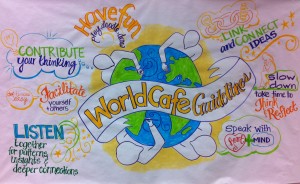Earlier this month I co-hosted a Community Café on Racial Bias and Racism in Olympia. The event was sponsored by the Olympia Police Department (OPD) and the Black Alliance of Thurston County (BATC). These organizations wanted to bring citizens together in conversation around concerns related to the officer-involved shooting of two black men in May 2015 in Olympia. This Café was the first citizen gathering in our community designed for participants to talk to each other. Previous gatherings allowed citizens to speak one by one to figures of authority (“town hall”), or listen to a panel discussion by surrogates.
A colleague, Alicia Luna, and I were invited to help because of our experience designing and hosting different kinds of difficult or challenging conversations. We’re both also part of the Community Café Collaborative in Washington.
On the night of the Café, we set up tables and chairs for 60 people. First to arrive were members of the OPD. Gradually other citizens arrived and the room began to fill. We did our best to greet each participant, but about ten minutes before we intended to welcome the whole group and begin the event, we realized we needed more tables. Ultimately we had 16 tables and 90 people (yes, more than 4/table), significantly more than we anticipated would brave the wind and rain.
The group was mostly white and older. There were about 20 people of color, also mostly older. A reporter from The Olympian newspaper participated fully in the Café and wrote the story linked above.
Design:
Dr. Karen Johnson (BATC) and Chief Ronnie Roberts (OPD) welcomed everyone and shared the objectives of what is to be a series (through mid-2016) of Community Café conversations:
- provide a welcoming space for people to talk to each other about their experience with race and racial bias;
- raise awareness about institutional (or systemic) racism; and,
- build trust for the conversation about the overarching topic of fair and impartial policing in Olympia.
The purpose of tonight’s Community Café was to share our individual stories about race and racial bias.
Speaking to the group, I acknowledged that everyone in the room had chosen to be here tonight. They had said “no” to something else in their lives also important. Then I invited everyone to have a conversation with a single partner – someone they don’t know – responding to the question, “Why was it important for you to be here tonight?”
After this 10-minute introductory conversation, we offered a few Community Café (i.e., World Café) guidelines to help us in the subsequent conversations:
Then, four conversations:
With a single other person, someone you don’t know: “Share a story or experience when you felt prejudged by someone, when you felt you were the object of prejudice. How did you respond? What did you do to get through it?”
At full tables: “What has been your personal experience with racial bias in this community? (If you have no personal experience with racial bias, please listen attentively to those who have, and then join in the conversation).”
At full tables (after changing tables): “When you experience racial bias, or hear about someone else experiencing racial bias, what does it feel like? What emotions are evoked?”
At full tables (after changing tables): “What are my perceptions of our city and our community? What does my city and my community need to cultivate in order to reduce the impact of racial bias?”
Reflection and harvest: “Pause for a few moments and consider your experience. What insights have you had into your own thinking? How has your thinking shifted? What idea or belief have you left behind? Reflect in silence for one minute, please.”
Some things that arose during the whole-group harvest:
- Many voices in the community are not represented here tonight
- Olympia retail business owners need to be in the room
- We can’t “do it all” in one conversation
- It takes time to do this work, and to get to know one another
- It’s white people who need to do the work
- I hadn’t thought about these problems in this way before
- I’ve never listened to someone’s story about their experience being a person of color in our community
- Eventually we want to talk about fair policing
Chief Roberts and Dr. Johnson closed the evening by thanking all the participants for their sincerity and authenticity.
As our team began to break down the room, numerous knots of conversation persisted. I was satisfied with the evening, and had these four things to improve:
- Due to the size of the group, we needed to have the questions on flip charts in more than one spot
- Smaller tables!
- More physical harvesting (post-it notes, for example)
- Closing check-out to hear all voices

